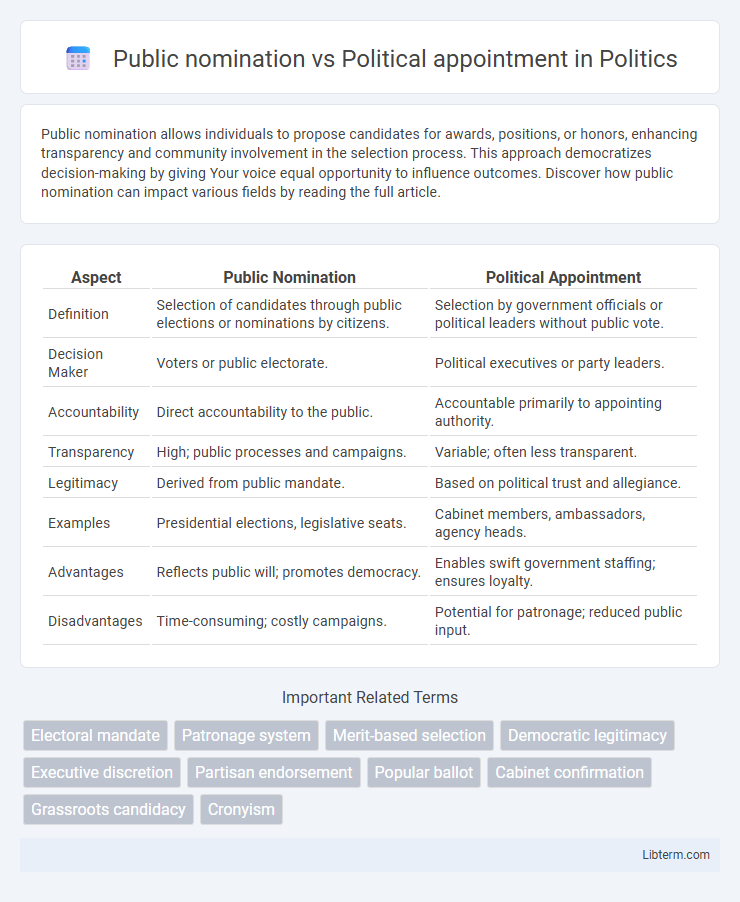Public nomination allows individuals to propose candidates for awards, positions, or honors, enhancing transparency and community involvement in the selection process. This approach democratizes decision-making by giving Your voice equal opportunity to influence outcomes. Discover how public nomination can impact various fields by reading the full article.
Table of Comparison
| Aspect | Public Nomination | Political Appointment |
|---|---|---|
| Definition | Selection of candidates through public elections or nominations by citizens. | Selection by government officials or political leaders without public vote. |
| Decision Maker | Voters or public electorate. | Political executives or party leaders. |
| Accountability | Direct accountability to the public. | Accountable primarily to appointing authority. |
| Transparency | High; public processes and campaigns. | Variable; often less transparent. |
| Legitimacy | Derived from public mandate. | Based on political trust and allegiance. |
| Examples | Presidential elections, legislative seats. | Cabinet members, ambassadors, agency heads. |
| Advantages | Reflects public will; promotes democracy. | Enables swift government staffing; ensures loyalty. |
| Disadvantages | Time-consuming; costly campaigns. | Potential for patronage; reduced public input. |
Introduction to Public Nomination and Political Appointment
Public nomination involves selecting candidates through transparent processes where the general public or relevant stakeholders propose individuals based on merit and community trust. Political appointment refers to the designation of individuals to official positions by elected officials or government leaders, often reflecting political loyalty or strategic considerations. Understanding the distinction highlights the balance between democratic participation and political influence in governance.
Defining Public Nomination
Public nomination involves a transparent selection process where candidates are proposed based on merit and public support rather than political allegiance. This method emphasizes community engagement and accountability, ensuring nominees reflect the electorate's preferences. In contrast, political appointments are determined by elected officials or party leaders, often influenced by political loyalty and strategic considerations.
Understanding Political Appointment
Political appointment involves selecting individuals to key government positions based on political loyalty, experience, or expertise, bypassing public elections. This process allows the executive branch to quickly fill strategic roles with trusted allies or specialists, often confirmed by legislative bodies. Understanding political appointments highlights their impact on governance effectiveness, policy implementation, and the balance of power within government institutions.
Key Differences Between Public Nomination and Political Appointment
Public nomination involves a transparent selection process where candidates are proposed based on merit, qualifications, and public support, often subject to legislative approval. Political appointment is the direct selection of individuals by political leaders, typically reflecting party loyalty, policy alignment, or political strategy, with limited public input. The key difference lies in the degree of transparency and accountability, with nominations emphasizing public vetting while appointments prioritize political discretion.
Advantages of Public Nomination
Public nomination enhances transparency and democratic legitimacy by involving citizens directly in the selection process, fostering greater trust in appointed officials. It promotes accountability as nominees are subject to public scrutiny and input, ensuring that candidates represent the community's interests and values. By encouraging diverse participation, public nomination broadens the pool of qualified candidates, improving the quality and inclusivity of leadership appointments.
Advantages of Political Appointment
Political appointment allows government leaders to select individuals with specialized expertise and loyalty, enhancing policy implementation and administrative efficiency. It provides flexibility to align key positions with the current administration's goals, facilitating coherent and responsive governance. This method also ensures accountability through direct oversight by elected officials, improving coordination and decision-making within public institutions.
Potential Drawbacks of Each Method
Public nomination can lead to candidates lacking the necessary expertise or qualifications, as popularity often overshadows merit in the selection process. Political appointments risk fostering cronyism and partisan bias, potentially undermining fairness and competency in governance. Both methods may result in inefficiencies and reduced public trust if transparency and accountability are not rigorously maintained.
Case Studies: Successful Examples Around the World
Public nominations in countries like Switzerland emphasize direct citizen involvement, enhancing transparency and accountability in governance. Political appointments, exemplified by Singapore's meritocratic system, leverage party expertise to ensure effective policy implementation and leadership stability. Case studies from New Zealand reveal hybrid approaches, balancing democratic legitimacy with professional competence to optimize governmental performance.
Public Opinion and Trust in Selection Methods
Public nomination processes often generate higher public trust as they involve transparent criteria and broad community participation, reinforcing democratic values. Political appointments, while efficient, may face skepticism due to perceived partisan bias and lack of openness, impacting public opinion negatively. Surveys indicate that trust in selection methods correlates strongly with perceived fairness and accountability in the nomination or appointment process.
Future Trends in Leadership Selection
Future trends in leadership selection indicate a shift towards more transparent public nomination processes, emphasizing community engagement and merit-based criteria. Political appointments may increasingly incorporate digital platforms for broader participation while balancing expert evaluations to ensure qualified candidates. Data-driven decision-making and artificial intelligence are expected to play growing roles in identifying leaders who align with evolving societal values and governance needs.
Public nomination Infographic

 libterm.com
libterm.com